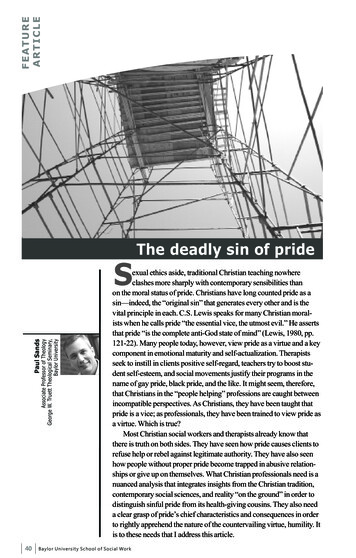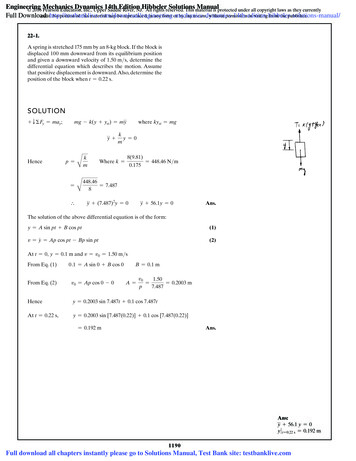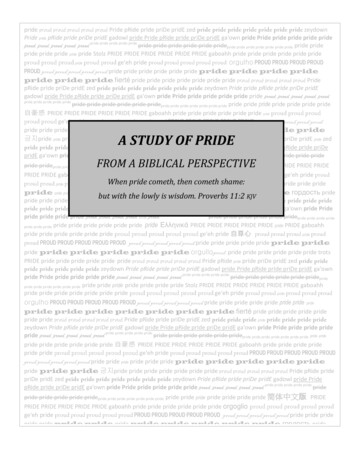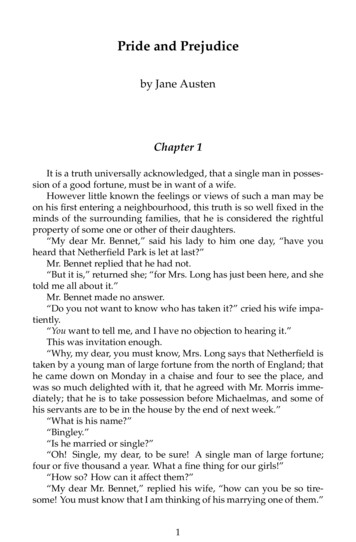
Transcription
FEATUREARTICLEPaul SandsAssociate Professor of TheologyGeorge W. Truett Theological Seminary,Baylor UniversityS40The deadly sin of prideexual ethics aside, traditional Christian teaching nowhereclashes more sharply with contemporary sensibilities thanon the moral status of pride. Christians have long counted pride as asin—indeed, the “original sin” that generates every other and is thevital principle in each. C.S. Lewis speaks for many Christian moralists when he calls pride “the essential vice, the utmost evil.” He assertsthat pride “is the complete anti-God state of mind” (Lewis, 1980, pp.121-22). Many people today, however, view pride as a virtue and a keycomponent in emotional maturity and self-actualization. Therapistsseek to instill in clients positive self-regard, teachers try to boost student self-esteem, and social movements justify their programs in thename of gay pride, black pride, and the like. It might seem, therefore,that Christians in the “people helping” professions are caught betweenincompatible perspectives. As Christians, they have been taught thatpride is a vice; as professionals, they have been trained to view pride asa virtue. Which is true?Most Christian social workers and therapists already know thatthere is truth on both sides. They have seen how pride causes clients torefuse help or rebel against legitimate authority. They have also seenhow people without proper pride become trapped in abusive relationships or give up on themselves. What Christian professionals need is anuanced analysis that integrates insights from the Christian tradition,contemporary social sciences, and reality “on the ground” in order todistinguish sinful pride from its health-giving cousins. They also needa clear grasp of pride’s chief characteristics and consequences in orderto rightly apprehend the nature of the countervailing virtue, humility. Itis to these needs that I address this article.Baylor Univer sit y School of Social Work
The Nature of Prideon stock portfolios, beauty contests, or socialprominence; it is the fruit of a clear-eyed asFew words in our moral vocabularysessment of one’s own character and achieveconvey so wide a spectrum of meanings asments. As such, proper self-esteem is a“pride.” It can connote anything from narcisbarometer that rises and falls with the qualitysism to self-confidence to self-respect. Manyof one’s life. Good people should feel gooddisagreements over the moral status of prideabout themselves; bad people should not.can be traced to differences in how the wordPride should not be confused withis understood. A classic definition of viciousself-love. Christians commonly condemnpride is the one put forward by the Medievalself-love as a form of narcissism. But JesusJewish philosopher, Baruch Spinoza: “Pride ishimself commanded his followers to lovethinking more highly of oneself than is just, outothers as themselves (Matt. 22:39). As Frederof love for oneself” (Neu, 1999, p. 54). In otherick Buechner notes, Christ’s command canwords, pride is inordinate self-esteem arisinglegitimately be reversed to say “love yourout of self-centeredness. Although correct asself as you love others.” Buechner adds thatfar as it goes, this definition does not quite doself-love “does not mean your pulse shouldjustice to pride’s irreligiousness and aggresquicken every time you look into a mirror anysiveness. I would propose, therefore, that pridemore than its supposed to quicken every timeis best viewed as an irreligious and antisocialyour neighbor passes the window” (Buechner,assertion of the self. But before fleshing out2004, pp. 322-23). One can care for self andwhat this definition entails, it is important toothers without being enamored of either. Obdistinguish pride from related but differentsession with oneself is not true self-love, justconcepts.as obsession with a lover is not true romance.Clarifying the ConceptFinally, pride should notPride should not be conbeconfusedwith feelingfused with self-respect. UnlikeProper self-esteem is aproud.Prideis an endurpride, self-respect does noting character trait; “feelingbarometer that rises andimply feelings of superiority.proud” is a transitory emotion.As the philosopher Jeromefalls with the quality of one’sOne can feel proud withoutNeu points out, it has to dobeing proud. A researcherlife. Good people should feelwith rights and dignity, notwho discovers an importantmerit (Neu, 1999, p. 74). Thegood about themselves; badnew cancer therapy can beperson with self-respect “haspeople should not.elated by her achievementher pride,” but that meanswithout being “puffed up” byshe is ashamed to violate herit. Indeed, if her work leadsconscience, not that she thinkstopublichonors, she will likelyherself better than others (Taylor, 1985, p. 50).feelbothproudandhumbled by the recogniSelf-respect is indispensable to a life of virtue.tion.Amanwhosesonjoins a prestigiousIt is the skeleton of the soul that protects integNew York law firm might almost “burstrity by preventing the wrong sort of flexibility.with pride,” but his feelings are a proper andA person may have too much self-esteem, butnatural expression of love. The father identino one can have too much self-respect (Neu,fies with his son and thus shares his elation.1999, p. 74).Ironically, the failure to feel pride over honPride should also not be confused withors received by oneself or loved ones mayproper self-esteem. Christians are sometimesactually be an expression of pride. It mayquick to condemn all self-satisfaction as anreflect a sense of superiority—a haughtyexpression of sin. There is a proper self-esteemdisdain for honors and the people who givethat is the result of evaluating oneself withthem (Taylor, 1985, pp. 43, 45-46).“sober judgment” (Rom. 12:3). It is not basedFamily and Communit y Ministries41
Vicious Pridesets it apart. That is whyPride finds pleasure onlyWilliam May calls prideSinful pride mustin what sets it apart.“the sin of the first personnot, then, be confusedsingular.” Proud peoplewith self-respect, propernot only put themselves before others, theyself-esteem, self-love, or “feeling proud”—separate themselves from others—sometimeseach of which is essential for human flourishunder the cover of religious piety. May notes,ing. As already noted, pride is best viewed asfor example, that a proud monk will be intentan irreligious and antisocial assertion of theon proving himself to be “singular and excepself. We see this in the way pride elevates thetional.” He will be “inclined to fast more, prayself over others. We say the proud are “stucklonger, sleep less, look sicker than his fellows,up” and complain that they “look down theirproving that he is a singularly holy man.” Anynoses” at everyone else. We complain that theydiscipline that “must be done in common withride a “high horse” and isolate themselves inhis brothers automatically loses its luster”an “ivory tower.” We criticize them for acting(May, 1967, p. 184).“high and mighty.” The Hebrew Bible oftenhighlights pride’s penchant for heights. In theVarieties of Prideprimeval history, humankind seeks to buildWe can see, then, that pride is an assertion“a tower with its top in the heavens” (Gen.of the self that is both irreligious and antisocial.11:4). Proverbs depicts the proud as havingThe actual form pride takes will vary from“lofty eyes” (Pro. 30:13). Jeremiah speaks ofperson to person. In general, however, we mayproud Moab’s “loftiness” (Jer. 48:29; cf. Isa.say that the “genus” pride appears in three2:11). Isaiah records a king’s boast that he will“species”: vanity, conceit, and arrogance.“ascend to heaven,” raise his throne “above the1. Vanity. Vanity is preoccupied with apstars of God,” and make himself “like the Mostpearances. The vain person does not so muchHigh” (Isa. 14:13-14).seek to be admirable as to be admired. He orAnother way to say the same thing is to sayshe derives self-esteem from the turned head,pride expands the self. The proud are “full ofpublic honors, and tokens of success. Taylorthemselves”—“puffed up” or “inflated” withnotes, “The vain offer their appearance as aself-importance. They fantasize about beingmeans of seducing others into thinking well“larger than life” and fear nothing more thanof them, which in turn is a means of seducshrinking in power or visibility. Proud peopleing themselves to think well of themselves”assert themselves and disregard the opinions(Taylor, 2006, pp. 76-77).and needs of others. They resent any boundaryBecause the vain depend on an admiringthat constricts their freedom to act as they wish.audience to brace up their tenuous selfThe proud also assert the self by layingesteem, they are vulnerable to the shiftingclaim to glory. They imagine themselves toopinions of the crowd, the passage of time,be radiant with success or beauty or intellithe contingencies of fate, and the prominencegence or virtue or piety. Their self-glorificationof competitors. Vanity is thus the most fragilecan sometimes lapse into absurdity, as whenform of sinful pride. In a sense, it is the mostNebuchadnezzar surveyed the city of Babylon“humble” form of pride because it relies onfrom atop his palace and exclaimed, “Is thisthe approval of others (Lewis, 1980, p. 126).not magnificent Babylon, which I have builtOf course, vanity’s self-preoccupation, lustas a royal capital by my mighty power and forfor the limelight, and snobbishness are devoidmy glorious majesty?” (Dan. 4:30). Althoughof authentic humility.scripture says that all human beings have been2. Conceit. Conceit is an exaggerated“crowned” with glory (Psa. 8:5), Nebuchadopinion of one’s virtues and accomplishnezzar was not interested in sharing gloryments. It seeks not so much excellence aswith others. Pride finds pleasure only in whatsuperiority and therefore is inherently com42Baylor Univer sit y School of Social Work
Sterling Severns Photopetitive (Taylor, 2006, pp. 73-74). As a result,conceit is intensely adversarial. It demandspreeminence and will brook no rival. If needbe, the conceited will diminish others toelevate themselves—as when an academicdismisses a colleague’s genius by noting herlack of “common sense,” or when a musiciandisparages a peer’s work because it is toopopular to be “serious.” We see conceit in thePharisee who, casting a contemptuous glanceat a nearby tax collector, piously thanked Godthat he was not “like other people: thieves,rogues, adulterers, or even like this tax collector” (Luke 18:11).Conceit depends on transmuting real orimagined virtues into a general feeling ofpersonal superiority. Thus, a conceitedphysicist who cannothit a baseball, play aviolin, or manage asmall business willthink himself superiorto those who can—superior, that is, asa human being, notsimply as a scientist.The conceited personthinks himself superior in everything that really matters. Taylorcomments,It is not just that he thinks his socialstatus, or his taste, or his learning issuperior to that of others; he also takes itfor granted that these characteristics areso central to superiority that nothing elsewill count: he is superior in the areas thatmatter and in the only areas that matter.If there is some respect in which anotherexcels and he does not, then this is neither here nor there as far as the superiority of his position is concerned (Taylor,1985, pp. 44-45).It should be noted that conceit consistsin the self-perception of superiority whetheror not it has been “earned.” People may, forexample, take pride in being born with exceptional athletic ability, a fine singing voice,or even white skin. That is why the apostlePaul failed to puncture the Corinthians’conceit when he demanded, “What do youhave that you did not receive? And if youreceived it, why do you boast as if it werenot a gift?” (1 Cor. 4:6).3. Arrogance. Arrogance is a feeling ofsuperiority that shows itself in a lofty, overbearing manner. Whereas vanity needs admirers and conceit needs inferiors, arroganceneeds no one. It stands clear of the crowd. Thearrogant are a law unto themselves; they donot need other people to validate their selfimage. What other people think or achieve isneither here nor there. The arrogant are tooproud to be vain or conceited (Taylor, 1985,p. 48; Taylor, 2006, p.82). We may say, then,that arrogance is theepitome of pride—the“sin of the first personsingular” in its purestexpression.These three formsof pride—vanity, conceit, and arrogance—often crop up togetherin various combinations and degrees. Individuals tend to fall into predominate types,but people are complex and constantly changing and so are likely to defy simple labels. Aarrogant executive, for example, might amusehis colleagues by some petty vanity—such ashis odd way of combing hair over a bald spot,or his refusal to wear glasses in public. Or asuccessful author’s conceit might float freeinto a general attitude of arrogance. Vanity,conceit, and arrogance are distinguishable butnot discreet concepts. Classifying pride intothree species has merely a heuristic value. Ithelps to lay bare the varied and subtle manifestations of sinful pride.Consequences of PridePride gives rise to human misery as sowinga field yields a harvest. From a biblical point ofview, we may say that pride leads to calamity,fosters self-contempt and self-pity, underminesFamily and Communit y Ministries43
community, and alienates from God.1. Pride leads to calamity. “Pride goesbefore destruction,” says the sage, “and ahaughty spirit before a fall” (Prov. 16:18). Thefall of the proud is often ascribed in the Bibleto divine judgment. The proud Persian courtierHaman was hung from the very gallows he hadbuilt for the execution of Mordecai—a manwho had infuriated Haman by refusing to doobeisance. Nebuchadnezzar exulted in his ownglory and was rewarded with madness. He didnot return to his throne until he “learned thatthe Most High has sovereignty over the kingdom of mortals and gives it to who he will”(Dan. 4:30-33). King Sennacherib boasted ofhis might and defied God—and shortly thereafter was murdered by his sons. Herod waslauded as a god, but he was struck down by anangel “because he had not given glory to God”(Acts 12:20-21). The psalmist declared thatGod had placed the proud on slippery ground:even at the height of their prosperity andearthly security, they are never far from ruin(Psalm 73:4-20). Obadiah declared to Edom,Your proud heart has deceived you,you that live in the clefts of the rock,whose dwelling is in the heights.You say in your heart,“Who will bring me down to the ground?”Though you soar aloft like the eagle,though your nest is set among the stars,from there I will bring you down, says theLORD (Obadiah 1:3-5).A day is coming, said Isaiah, when “thehaughty eyes of people shall be broughtlow, and the pride of everyone will behumbled” (Isa. 2:11).Passages such as these do not mean that Godimposes arbitrary penalties to “punish” theproud. The biblical view of sin and punishment is rooted in the ancient Hebrew habit oftreating wrongdoing and its penalty as different aspects of a single phenomenon. Forthe Hebrew mind, sin consists both in wrongdone and consequences endured. Guilt cannotbe separated from its painful results. That iswhy the Old Testament says that God brings asinner’s conduct down upon his own head (144Baylor Univer sit y School of Social WorkKings 8:32). God does not so much “punish”sin as uphold the moral order he has created.This moral order was designed to secure human well-being, but those who violate it injurethemselves, others, and the creation (Biddle,2005, pp. 14, 123–24).Pride’s own trajectory leads to disaster.Proud people spread calamity by overestimating their abilities, setting unrealistic goals,refusing to respect appropriate limits, andpushing themselves too hard (Schimmel,1992, p. 30). Thus corporate climbers become dependent on amphetamines, ambitiouspastors lead churches into fiscal disaster, andathletes overtrain and sustain career-endinginjuries. Pride also leads to “spectacularly badjudgments” because proud people pursue theirgrandiose goals without adequate planning orresources. As William Willimon points out,people convinced of their own brilliance aresure to make stupid mistakes—as when someone thinks a string of business successes makeshim a financial genius who can ignore standardbusiness practices. Such a person stands on theprecipice of disaster (Willimon, 2005, pp. 3637). The consequences of pride’s rashness canbe far-reaching. Schimmel notes,In our society, where knowledge is powerand experts shape public policy in everyfield, intellectual arrogance is common andcan be dangerous. The economist, militarystrategist, or physician who, so sure of him-
self that he neglects to solicit informationand advice from others, can be responsiblefor events that can bring harm to many(Schimmel, 1992, p. 32).“The wise are cautious and turn away fromevil,” says the Bible, “but the fool throws offrestraint and is careless” (Prov. 14:16).2. Pride leads to self-contempt and selfpity. Although pride is a self-expansive vice,it sometimes plunges people into periods ofself-contempt and self-pity. This swing fromone extreme to the other is paradoxical butnot inexplicable. As noted earlier, pride is partof a strategy for coping with low self-esteem.People who think poorly of themselves willoften compensate by creating an imaginaryself—an “ideal self” thought to possess prizedattributes like brilliance, beauty, skill, virtue, orthe like. Individuals naturally seek to create anideal self that they themselves find believable.A plain girl, for example, will be more likely toimagine herself to be an unrecognized geniusor a saint than a beauty. Whatever the precisecharacter of the idealized self, its purposealways remains the same: to bolster a fragileself-esteem.However, no matter how firmly a personidentifies with her idealized self, reality has away of spoiling the fantasy. A self-styled genius may score too low on the GRE to get intograduate school or a “saint” may get caught ina lie. Failure to measure up to the idealized selfcan sometimes cause a person’s psychologicaldefenses to collapse. She will then swing fromgrandiosity to self-loathing and self-pity.To recover her self-esteem, the proudperson will likely employ two strategies. Shewill minimize her failure by insisting that itis inconsequential: to fail in a matter of solittle importance was not really a failure at all.She will also attempt to excuse her failure byclaiming that success was impossible becauseof some circumstance beyond her control:the failure did not really “count.” Both strategies allow the proud person to save face. Thepunctured ego reinflates itself with rationalizations. Pride thus completes the cycle fromgrandiosity to self-contempt and back again tograndiosity.When face-saving excuses portray the selfas a victim, pride expresses itself as self-pity.May explains,Beneath the most unheroic expressions ofself-pity can lurk no less stubborn a claimto one’s own divinity. The high estimate ofthe self in this case is based on a pretensionto divine virtue rather than divine power.The man who drenches himself with selfpity is convinced that underneath it all he isa splendid fellow, a rather precious innocent, much abused or neglected by a harshenvironment in which he is trapped (May,1967, p. 185).Self-pity usually leads to depression. Thedepression will tend to persist because it servesa pride-saving strategy that the individual isloath to acknowledge or surrender.3. Pride undermines community. Community consists in people living with one anotherinterdependently and with mutual concern.Individuals in a crowd may share nothing butproximity, but individuals in a communityhave “the same care one for another” (1 Cor.12:25). The proud, however, are too selfabsorbed to empathize with other people. Theytend to see others, not as independent personsof worth, but as extensions of themselves. Accordingly, they think nothing of asserting theirwants against the legitimate needs of familyand friends. Conflict ensues. Resentments andrecriminations get stirred up on every side.The proud are too competitive to livepeaceably with others. By seeking first place,they promote quarrels, resentments, envy,and backbiting. We see this in the church atCorinth. Pride had inspired the Corinthians toform cliques around various leaders; and thesecliques competed with one another for controland prestige. We see the same phenomenonin the disciples of Jesus, who turned on oneanother when two of them sought a place ofhonor above their fellows (Mark 10:35-41).The proud show contempt toward thosethey regard as their inferiors. Jesus unmaskeda religious form of this attitude when he aimeda parable at those “who trusted in themselvesFamily and Communit y Ministries45
that they were righteous and regarded othas to be cold and dead and averse to the presers with contempt” (see Luke 18:9-14). Butence of God” (May, 1967, pp. 176-77). It is adisdain of others hardly needs religious cover.particular instance of the alienation from GodAs Schimmel observes,characteristic of unredeemed humanity (Col.In our society the most desirable assets1:21; Eph. 4:18; cf. Rom. 5:10; 8:7).are wealth, power, social status, physicalIn effect, pride alienates people from Godattractiveness, and intelligence. . . . Asbecause it leads them to feel self-sufficient.Aquinas said, a person who possesses moreMcCracken comments,of these than do other people may believeIt is the essence of man’s pride to assumethis entitles him to special privilege, or thatthat he is self-sufficient and that by hishe is exempt from behaving with respectefforts and skills he can take care of himand empathy toward others. It may makeself, order his affairs, do for himself allhim contemptuous of human weakness andthat has to be done. The serpent in temptindifferent to the needs of others (Schiming Adam and Eve promised: “You willmel, 1992, p. 36).be as gods.” Here is the primary temptaThe proud also chafe under the legitition, to put ourselves where God shouldmate authority without which no communitybe—at the center of things, to ignore ourcan survive. We see proud rebellion in twocreatureliness and finiteness as though weepisodes from the life of Moses. In the first,were self-made and self-adequate, andAaron and Miriam—the brother and sisterassert our independence and sovereigntyof Moses—accused their younger sibling of(McCracken, 1966, p. 12).arrogating too much power to himself.“Has the LORD spoken only throughVice decays wherever virtueMoses?” they demanded. “Has he notalso spoken through us?” (Num. 12). Inflourishes. One should attack pridethe second episode, two hundred andby cultivating humility.fifty leaders in Israel rose up to challenge Moses. “All the congregationThis sort of self-assertion is incompatibleare holy, every one of them, and the LORDwith a true knowledge of God. As C. S. Lewisis among them,” they said. “So why do youexplains, “In God you come up against someexalt yourself above the assembly of thething which is in every respect immeasurablyLORD?” (Num. 16). In both instances, thesuperior to yourself. Unless you know God asintegrity of the community was threatened,that—and, therefore, know yourself as nothnot by the alleged pride of Moses, who wasing in comparison—you do not know God at“very humble,” but by the pride of subordiall.” Of course, the proud are ready to admitnates who resented legitimate authority.theoretically that they are nothing before4. Pride alienates from God. WhetherGod, but they “are really all the time imaginconsciously or not, the proud are estrangeding how he approves of them and thinks themfrom God. As May explains, “Pride is selffar better than ordinary people” (Lewis, 1980,devotion, self-justification, and self-gloryingp. 124). Be it ever so religious, pride alienatesin contempt of God.” This contempt mayhumans from God.give rise to open revolt, but not always. It isThe Way of Humilityusually expressed as “aversion” of God. TheVice decays wherever virtue flourishes.proud person finds the existence of God “anunwholesome intrusion into his life—uncomOne should attack pride by cultivating hufortable, irritating, and hopelessly confining.”mility. But just as we had to distinguish prideMay states that pride consists in “cleaving tofrom related concepts, so we must distinthe self and its loves and fears in such a wayguish authentic humility from sham humility46Baylor Univer sit y School of Social Work
and self-loss. In the discussion below, I willmake the needed distinctions and then offersome thoughts on how one might go aboutcultivating humility.Clarifying the ConceptHumility is sometimes confused withsham humility. Authentic humility is basedon realistic self-appraisal. The humbleevaluate themselves with “sober judgment”(Rom. 12:3). They are sensible and balancedin their judgments because they know thatevery human being is a mixture of good andbad. For this reason, the humble are able toacknowledge their faults without becoming oppressed by them. Sham humility, onthe other hand, lacks a sense of proportion.It elevates peccadillos into crimes againstheaven. It counts every flaw as proof that theself is fundamentally defective. Sham humility leaves one feeling demoralized, depleted,weak, fragile, and hopeless (Rubin, 1975, p.29). People who live under a cloud of shamhumility are “condemned to live constricted,deformed, frustrating lives, cut off from possibilities for self-realization, self-fulfillment,and happiness.” Robin Dillon explains,When the abiding flavor of your life isshame or self-contempt; when you have aprofound and pervasive sense of yourselfas inadequate, pathetic, like dirt; whenyour life feels meaningless, your activities of little value, your abilities minimal,your character base; when feelings ofworthlessness swamp everything else—when living feels like this, living well isimpossible (Dillon, 1997, p. 226).The roots of sham humility vary fromperson to person. Some people disparagethemselves because their self-identity has beenshaped by criticism or abuse. Others disparagethemselves to preempt criticism or elicit sympathy. Still others do it when they feel shamefor failing to earn more money, write morebooks, attract more attention, or demonstratemore saintliness than others. Whatever itssource, sham humility is a knock-off of the realvirtue and must not be confused with it.Humility is sometimes confused withself-loss. Self-loss entails the dissolution of theself. People who have lost themselves are notcentered, independent persons—they are appendages to other people’s lives. They sacrificeand serve and suffer. Family and friends praisethem for their humility, but in reality they areincapable of authentic virtue because they arenot integral selves.Feminist scholars have argued that selfloss rather than pride is the “typical” feminine sin. Valerie Saiving notes, for example,that women are less prone to proud selfassertion than to “triviality, distractibility,and diffuseness; lack of an organizing centeror focus; dependence on others for one’sself-definition; tolerance at the expense ofstandards of excellence; inability to respectthe boundaries of privacy; sentimentality;gossipy sociability, and mistrust of reason—in short, underdevelopment or negation ofthe self” (Saiving, 1979, p. 37). According toJudith Plaskow, women most commonly sinby failing to be a self—that is, by refusingto accept the burden of responsible freedom(Plaskow, 1980, p. 66). Susan Nelson Dunfee calls this refusal the sin of “hiding.” Shemaintains that by relentlessly damning pride,Christian theology has “perpetuated patternsof bondage and repression rather than breaking them” (Dunfee, 1982, p. 317). Womenhave been made to feel guilty and anxiouswhenever they assert themselves—evenwhen failing to do so would be irresponsible. According to Dunfee, Christian theolFamily and Communit y Ministries47
ogy must teach that “the call of God to fullhumanity is the call into freedom to nameoneself, to asset one’s selfhood, and to knowpride in oneself” (Dunfee, 1982, p. 322).Perhaps some feminist scholars haveoverstated their case. Women are socializedto be less self-assertive than males, but pridecomes in many forms—not all of which aremarked by “masculine” aggressiveness.Nevertheless, feminists have called attentionto the way Christians sometimes mistake selfloss for humility. Humility does not excludeself-respect, proper self-esteem, self-love,and feelings of pride.Sometimes Jesus’ teachings are misinterpreted to mean that Christian discipleshipentails the loss of one’s self. Jesus said thatpeople can “save” their lives only by “losing”them (Matt. 10:39; 16:25; Mark 8:35; Luke9:24) and commanded his followers to “denythemselves” and “take up their cross” (Mark8:34; cf. Matt. 16:24; Luke 9:23). But in thesepassages, Jesus calls for uncompromisedloyalty to the kingdom of God, not the dissolution of the self. Jesus himself modeled whathe commanded, and no one could accuse himof being a timid, outer-directed man. Whenopposed by religious authorities, he refused toback down. When standing before the Sanhedrin and later Pilate, he was self-confident,self-possessed, and properly assertive. Jesusnever caved in to the crowd, never groveledbefore power, never appeased critics. No onewho follows Jesus authentically will sufferself-loss.Cultivating HumilityBecause humility depends on accurateself-assessment, it requires rigorous and wiseself-examination. Rigorous self-examinationseeks only truth; it gives no place to egosaving rationalizations or self-flattery. Unfortunately, human beings do not find suchhonesty easy. Social psychologist David G.Myers notes that “experiments have revealedthat people tend to attribute positive behaviors to themselves and negative behaviors toexternal factors, enabling them to take creditfor their good acts and deny responsibility48Baylor Univer sit y S
Self-respect is indispensable to a life of virtue. It is the skeleton of the soul that protects integ-rity by preventing the wrong sort of flexibility. A person may have too much self-esteem, but no one can have too much self-respect (Neu, 1999, p. 74). Pride should also not be c










